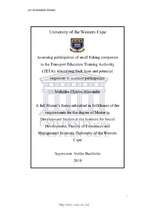COMPARING FACE-TO-FACE AND TECHNOLOGY-BASED TRAINING TO EVALUATE ITS PERCEIVED EFFECTIVENESS IN IMPROVING EMPLOYEE PERFORMANCE
Abstract
For several decades, the ideal and preferred traditional training delivery in organisations mainly comprised in-person, face-to-face training, and engagement. The twenty-first century introduced the Fourth Industrial Revolution, which witnessed great strides in technology and introduced technology-based and online training. This online method of training and development surged when the global COVID-19 pandemic came about in 2020 and made it necessary and imperative due to social distancing protocols. This foresaw the emergence of technology-based training within several organisations’ training environments globally, enabling and increasing flexible learning for employees. Although technology-based training is considered a desirable and revolutionary training method, its efficiency is based on individuals’ perceptions thereof, with many still favouring the traditional face-to-face training approach as part of their preferred learning style. This has raised the debate on whether organisations can transition from the traditional face-to-face training approach to a Technology based training approach and still enable staff to perform at an optimal level.
Related items
Showing items related by title, author, creator and subject.
-
Free or co-ordinated markets? education and training policy options for a future South Africa
Kraak, Andre (University of the Western Cape, 1994)This thesis is a comparative study of competing education and training (ET) policy options in South Africa today. The thesis examines the economic and ET policy proposals of the South African state, and in particular, the ... -
The implementation of skills-development legislation in the Western Cape: a study of the Naval Dockyard Simon's Town
Orgill, Claude Derek (University of the Western Cape, 2007)This study investigated the extent to which skills development is implemented within the naval dockyard Simon's Town within the context of the NSDS and the various forms of legislation. In March 2001 the Department of ... -
Assessing participation of small fishing companies in the Transport Education Training Authority (TETA): identifying fault lines and potential responses to increase participation
Alexander, Malcolm Charles (University of the Western Cape, 2019)The study focusses on the transport sector, where company participation level is measured at approximately 20% of levy paying enterprises, and this level is mostly based on relatively high levels of participation from ...




